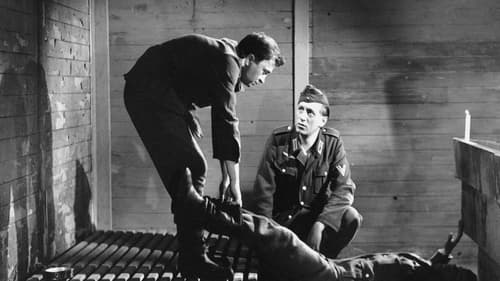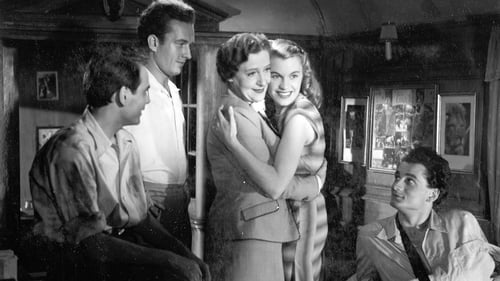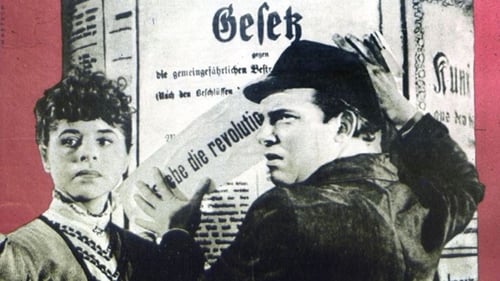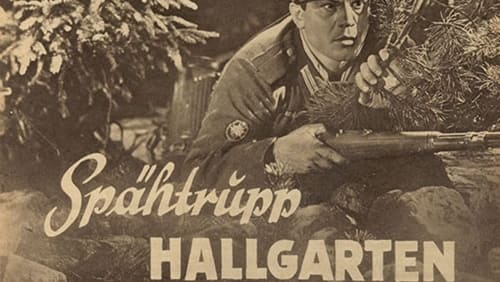
Major in the shooting range
Июнь 1941-го года. Граница III-го Рейха и Советского Союза. Трое друзей за хорошие результаты в боевой подготовке получают увольнительную и отправляются в город погулять и выпить пива. По дороге они решают поохотиться на цаплю, которую замечают в камышах, однако в ответ на дружный залп из винтовок из зарослей раздается женский крик. Растерянные приятели обнаруживают на берегу пруда окровавленное тело дочери командира части Ангелики, служившей в их роте связисткой. Друзья понимают, что девушку долго не хватятся, ведь она направлялась на вокзал, откуда должна была ехать к новому месту службы в глубокий тыл. Они прячут тело в пруду и пытаются забыть о случившемся. Но это оказывается не так просто. Самый младший из приятелей, Пауль Томас не может простить себе происшедшего и хочет признаться отцу убитой девушки. Понимая, что может произойти катастрофа, его старший товарищ, ефрейтор Лик, просит о помощи своего отца, группенфюрера ваффен-СС. Между тем, наступает 22 июня.

1.Beamter
После смерти мужа Карола Ламберти самостоятельно управляла семейным цирком. Но её трое сыновей, которые являются успешными артистами циркового представления, настаивают на том, что у них тоже есть право управления семейным бизнесом. После жёсткого семейного спора, Карола отошла от дел, и бизнесу грозит полный провал под неопытным управлением молодыми сыновьями…

Kriminalbeamter
Фильм переносит нас в Германию того времени, когда антисоциалистический закон, подписанный в 1878 году императором Вильгельмом II, жестоко подавлял растущее социал-демократическое движение. В центре всех событий того времени, в тесной связи с ними и с историческими деятелями рабочего движения, такими как лидеры рабочих Август Бебель и Вильгельм Либкнехт, стоит неизвестный простой человек, слесарь-механик Густав Шульц. Вместе с ним и его семьей мы переживаем горькие годы, в течение которых антисоциалистический закон действовал до его отмены, что стало мощным стимулом для дальнейшей борьбы как Шульца, так и всего немецкого рабочего класса.

Berlin 1952, seven years after WWII. Four women are looking for a good man and happiness in the divided city. Their destinies are loosely connected through one person: the West Berlin dandy and womanizer, Conny.

Hauptmann
Two German soldiers in the Norwegian Campaign.

Der Chauffeur Lona Elviras

Casinogast

Polizeibeamter in Uniform

Farmer

Wachbeamter bei Gericht

Ein Kollege Gerdas
A soldier thinks about leaving the army for a woman. His friends try to stop him.

Auktionator

Fabrikant

Zollbeamter
In a made-up country somewhere in northern Europe: In the armaments factory F.N.G., an important drawing is copied and passed on to the enemy. Suspicion falls on the chief engineer Alexander Nica and his assistant Laurenz. Both are placed before the court; accused by the night watchman Bruns; and sentenced to death for industrial espionage. Before sentencing, however, Nica succeeds in getting away. Now he’s trying to find proof to convince the court of his and Laurenz’ innocence.

Beamter

Ein Diamantenhändler als Schiffspassagier

Polizist
Sylvia has succeeded in making her son Robert a minister in the French Republic. His old servent, Gabriel, interrupts the young man during an "erotic" conference with the singer Betty. She's there, because her politically inappropriate songs is about to get her banned from the stage, which the minister would like to prevent. A fight breaks out between Robert and Gabriel and Sylvia, his mother, has to confess to Robert, that Gabriel is actually his father. When the minister once again misbehaves, this time at a ball, his servant and father Gabriel decides that the time has come to slap his son in everyone's presence. Robert is forced to resign and a journalist from the People's Front suggests Gabriel for the post of minister. - The film was classified after the end of the german third empire as a reservation film.

Pianist

Kriminalbeamter in New York

Kriminalbeamter Falke
The Berlin lawyer Dr. Lessner (Karl Ludwig Diehl) is involved in a murder case. His wife, movie star Christa (Kitty Jantzen), allegedly had an affair with singer Juan Navarro (Harry Hardt), who was found dead in front of Dr. Lessners house. Christa is arrested ...

Schallterbeamter beim Morning Post
After completing work on the British musical Invitation to the Waltz, Lillian Harvey returned to her adopted country of Germany to star in the comedy-with-music Glueckskinder (Children of Fortune). Harvey plays Ann Garden, an unemployed actress who ends up in night court on a loitering charge. Here she meets Gil Taylor (Willy Fritsch), a struggling songwriter temporarily employed as a court reporter. Hoping to keep her out of jail, Gil impulsively tells the judge that he's engaged to Ann -- whereupon the judge, equally impulsively, marries the couple on the spot! After this inauspicious start, Ann and Gil embark upon a rocky (but tuneful) whirlwind romance.

Kriminalbeamter

Ein Schaffner
Endstation offers the American viewer tantalizing glimpses of busy, bustling mid-1930s Vienna. Otherwise, this minor yarn of an amorous streetcar conductor is strictly formula material. The film benefits from the star power of Paul Horbiger, resplendently garbed in an elaborate conductor's uniform. Also worth noting is the performance of Maria Andergest as the woebegone hatmaker whose fate is inextricably linked with hero Horbiger. Incidentally though the direction is credited with one E. W. Emo, Paul Horbiger actually called most of the shots on Endstation.

An enhanced and sentimentalized story of love, honor, rivalry, and retreat. The traditional laws of the patriarchal environment and severe conflicts of the heart. The action takes place in Herzegovina and Stolac, Bosnia. The film depicts the Bosnjak from a German point of view.

Trainer

Narrator
Struggle for the Matterhorn (German: Der Kampf ums Matterhorn) is a 1928 German-Swiss silent drama film co-directed by Mario Bonnard and Nunzio Malasomma and starring Luis Trenker, Marcella Albani, and Alexandra Schmitt. The film is part of the popular cycle of mountain films of the 1920s and 1930s. Art direction was by Heinrich Richter. Based on a novel by Carl Haensel, the film depicts the battle between British and Italian climbers to be the first to climb the Matterhorn. Trenker later remade the film as The Challenge in 1938.











